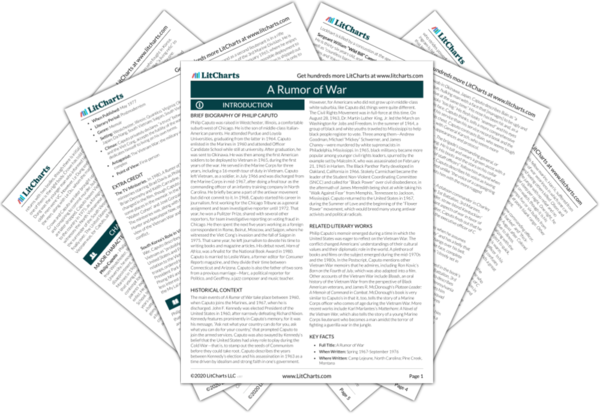Sergeant Hugh John “Sully” Sullivan Quotes in A Rumor of War
The corps would go on living and functioning without him, but it was aware of having lost something irreplaceable. Later in the war, that sort of feeling became rarer in infantry battalions. Men were killed, evacuated with wounds, or rotated home at a constant rate, then replaced by other men who were killed, evacuated, or rotated in their turn. By that time, a loss only meant a gap in the line that needed filling.
That night, I was given command of a new platoon. They stood in formation in the rain, three ranks deep. I stood front and center, facing them. Devlin, Lockhart, and Bryce were in the first rank, Bryce standing on his one good leg, next to him the faceless Devlin, and then Lockhart with his bruised eye sockets bulging. Sullivan was there, too, and Reasoner and all the others, all of them except me, the officer in charge of the dead. I was the only one alive and whole, and when I commanded […] they faced right, slung their rifles, and began to march. They marched along, my platoon of crippled corpses, hopping along on the stumps of their legs, swinging the stumps of their arms, keeping perfect time while I counted cadence. I was proud of them, disciplined soldiers to and beyond the end. They stayed in step even in death.
I had ceased to fear death because I had ceased to care about it. Certainly, I had no illusions that my death, if it came, would be a sacrifice. It would merely be a death, and not a good one either […] I was a beetle. We were all beetles, scratching for survival in the wilderness. Those who had lost the struggle had not changed anything by dying. The deaths of Levy, Simpson, Sullivan, and the others had not made any difference. Thousands of people died in each week in the war, and the sum of all their deaths did not make any difference. The war went on without them, so it would go on without me. My death would not alter a thing. Walking down the trail, I could not remember having felt an emotion more sublime or liberating than that indifference toward my own death.

Sergeant Hugh John “Sully” Sullivan Quotes in A Rumor of War
The corps would go on living and functioning without him, but it was aware of having lost something irreplaceable. Later in the war, that sort of feeling became rarer in infantry battalions. Men were killed, evacuated with wounds, or rotated home at a constant rate, then replaced by other men who were killed, evacuated, or rotated in their turn. By that time, a loss only meant a gap in the line that needed filling.
That night, I was given command of a new platoon. They stood in formation in the rain, three ranks deep. I stood front and center, facing them. Devlin, Lockhart, and Bryce were in the first rank, Bryce standing on his one good leg, next to him the faceless Devlin, and then Lockhart with his bruised eye sockets bulging. Sullivan was there, too, and Reasoner and all the others, all of them except me, the officer in charge of the dead. I was the only one alive and whole, and when I commanded […] they faced right, slung their rifles, and began to march. They marched along, my platoon of crippled corpses, hopping along on the stumps of their legs, swinging the stumps of their arms, keeping perfect time while I counted cadence. I was proud of them, disciplined soldiers to and beyond the end. They stayed in step even in death.
I had ceased to fear death because I had ceased to care about it. Certainly, I had no illusions that my death, if it came, would be a sacrifice. It would merely be a death, and not a good one either […] I was a beetle. We were all beetles, scratching for survival in the wilderness. Those who had lost the struggle had not changed anything by dying. The deaths of Levy, Simpson, Sullivan, and the others had not made any difference. Thousands of people died in each week in the war, and the sum of all their deaths did not make any difference. The war went on without them, so it would go on without me. My death would not alter a thing. Walking down the trail, I could not remember having felt an emotion more sublime or liberating than that indifference toward my own death.











